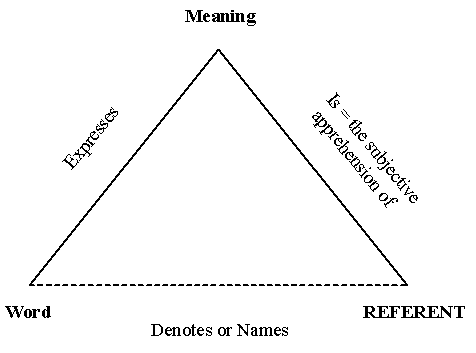「#1873. Stern による意味変化の7分類」 ([2014-06-13-1]) と同じものだが,Stern の著書の解題を執筆した山中 (10) に,意味変化の7分類がずっとわかりやすくまとめられていた.
A 紊????荀????
i 代用 (substitution)
(a) 指示対象の物的変化: house, ship, telephone
(b) 指示対象に関する知識の変化: atom, electricity
(c) 指示対象に対する態度の変化: scholasticism, Home Rule
B 言語的要因
I 表現関係の推移
ii 蕁??ィ (analogy)
(a) 結合上の類推: reversion [reversal とすべきところに]
(b) 相関的類推: red letter day → black letter day
(c) 音韻的類推: bless ? bliss, start naked ? stark naked
iii 縮約 (shortening)
(a) 短縮: pop < popular concert, props < properties
(b) ??????: fall (of the leaf), (sewing) machine
II 指示関係の推移
iv 命名 (nomination)
(a) 命名: Kodak, Tono-Bungay ─┐
(b) 転移: labyrinth [of the ear], crane ├ 意図的
(c) 隠喩: the herring-pond (= the Atlantic) ─┘
v 荵∝Щ (transfer)
(a) 類似性に基づくもの: pyramid, saddle ('鞍部') ─┐
(b) その他の関係に基づくもの: pigtails (= China men) │
III 主観的関係の推移 │
vi 代換 (permutation) ├ 非意図的
(a) 材料から産物へ: copper, nickel │
(b) 容器から内容へ: tub, wardrobe │
(c) 部分から全体へ: bureau, dungeon etc. │
vii 適用 (adequation): horn ('角' → '角製の笛' → 'ホルン') ─┘
補足までに,Stern の意味論は基本的に Ogden and Richards の意味の三角形 (semiotic triangle; cf. 「#1769. Ogden and Richards の semiotic triangle」 ([2014-03-01-1])) に基づいたものだが,用語を少し改変して次のようにしている(山中,p. 10).

さて,山中 (10) は解題のなかで Stern の通時的意味論をむしろ共時的意味論に多大な貢献をしたものとして評価している.
iv (b)--(c) と,Stern 自身が揺れ (fluctuation) という総称を与えた v--vii は意図的/非意図的という基準一つによって区別され,現象的には同種・同範囲である.別の角度からいえば,彼が「本来の意味変化」とみている「揺れ」は,伝達の場面場面で起こる共時的な転義と本質的に変わりがないということになる.通時的意味論は当初から修辞学への傾斜をみせていたが,Stern の徹底した心理学主義によってその深い理由が明らかになったとみることができる.すべての言語変化は日常の言語活動に根ざしている,別のことばでいえば共時的原理によって説明可能であるという Paul (1880) のことばを,通時的意味論はこの段階ではっきり追認したことになる.
これは,Stern にとっても通時的意味論にとっても皮肉なことに,通時的意味論は共時的な意味の原理に包摂され,それに吸い込まれるようにして自らの意義を消滅させていったという評だ.さらに Stern にとって皮肉なことに,意味の原理を論じている著書の前半部分には,共時的意味論において考慮すべき数々の二項対立が列挙されており,その重要性が今でも色あせていないことだ.そこでは,知的意味/主情的意味,語義/実際的意味,内在的意味/偶有的意味,意味/適用範囲,基本的意味/関係的意味,イメージ/思考,自義/共義などの区別が論じられている.
しかし,Stern に通時的ではなく共時的な貢献を認めて終えるという評価は,やや酷かもしれない.というのは,「#1686. 言語学的意味論の略史」 ([2013-12-08-1]) でみたように,共時的な意味論ですら言語学において独自の領域をもっているかどうかと問われれば,答えは怪しいからだ.意味にせよ意味の変化にせよ,学際的なアプローチで研究されるのが普通になってきた.つまり,言語そのものが学際的なアプローチなしでは研究できなくなってきている.いずれにしても,意味論史における Stern の古典としての価値は否定できない.
・ 山中 桂一,原口 庄輔,今西 典子 (編) 『意味論』 研究社英語学文献解題 第7巻.研究社.2005年.
・ Stern, Gustaf. Meaning and Change of Meaning. Bloomington: Indiana UP, 1931.